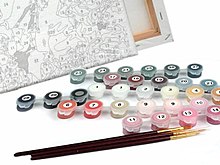Paint by number or painting by numbers kits are self-contained painting sets, designed to facilitate painting a pre-designed image. They generally include brushes, tubs of paint with numbered labels, and a canvas printed with borders and numbers. The user selects the color corresponding to one of the numbers then uses it to fill in a delineated section of the canvas, in a manner similar to a coloring book.

The kits were invented, developed and marketed in 1950 by Max S. Klein, an engineer and owner of the Palmer Paint Company in Detroit, Michigan, United States, and Dan Robbins, a commercial artist. When Palmer Paint introduced crayons to consumers, they also posted images online for a "Crayon by Number" version.

History
editThe first patent for the paint-by-number technique was filed in 1923.[1] Paint by Number in its popular form was created by the Palmer Show Card Paint Company. The owner of the company approached employee Dan Robbins with the idea for the project. After several iterations of the product, the company in 1951 introduced the Craft Master brand, which went on to sell over 12 million kits.[1][2] This public response induced other companies to produce their own versions of painting by number. The Craft Master paint kit box tops proclaimed, "A BEAUTIFUL OIL PAINTING THE FIRST TIME YOU TRY."
Following the death of Max Klein in 1993, his daughter Jacquelyn Schiffman donated the Palmer Paint Co. archives to the Smithsonian Museum of American History.[3] The archival materials have been placed in the museum's Archives Center where they have been designated collection #544, the "Paint by Number Collection".
In 1992, Michael O'Donoghue and Trey Speegle organized and mounted a show of O'Donoghue's paint-by-number collection in New York City at the Bridgewater/Lustberg Gallery. After O'Donoghue's death in 1994, the Smithsonian Institution's National Museum of American History exhibited many key pieces from O'Donoghue's collection, now owned by Speegle, along with works from other collectors in 2001.[3]
In 2008, a private collector[who?] in Massachusetts assembled over 6,000 paint-by-number works dating back to the 1950s from eBay and other American collectors to create the Paint By Number Museum, the world's largest online archive of paint-by-number works. In 2011, the Museum of Modern Art in New York accepted four early designs of paint by number by Max Klein for its Department of Architecture and Design, donated by Jacquelyn Schiffman.
In May 2011, Dan Robbins and Palmer Paint Products, Inc., together developed and brought to market a new 60th-anniversary paint-by-number set.[4] This collectors set was created in memory of the survivors and those who had lost their lives on September 11, 2001, and depicts the Twin Towers standing in spirit across the Manhattan skyline.
On April 1, 2019, Dan Robbins died in Sylvania, Ohio, at the age of 93.[5][6]
See also
editReferences
edit- ^ a b Seelye, Katharine Q. (April 5, 2019). "Dan Robbins, Who Made Painting as Easy as 1-2-3 (and 4-5-6), Dies at 93". The New York Times. Retrieved April 6, 2019. [dead link]
- ^ Langer, Emily. "Dan Robbins, paint-by-number inventor who made 'every man a Rembrandt,' dies at 93". Washington Post.
- ^ a b "PAINT BY NUMBERS". AmericanHistory.SI.edu. Retrieved April 6, 2019.
- ^ "Gone But Not Forgotten 2001". eazyarts.in. Retrieved 2022-10-26.
- ^ Seewer, John (April 4, 2019). "Artist who created first paint-by-numbers pictures dies". Associated Press. Retrieved April 6, 2019.
- ^ "Sylvania artist who created paint-by-numbers pictures dies". wtol.com. April 4, 2019. Retrieved April 4, 2019.
Further reading
edit- William L. Bird, Jr. Paint by Number: The How-to Craze that Swept the Nation. Washington, D.C.: Smithsonian Institution, National Museum of American History in Association with Princeton Architectural Press, 2001.